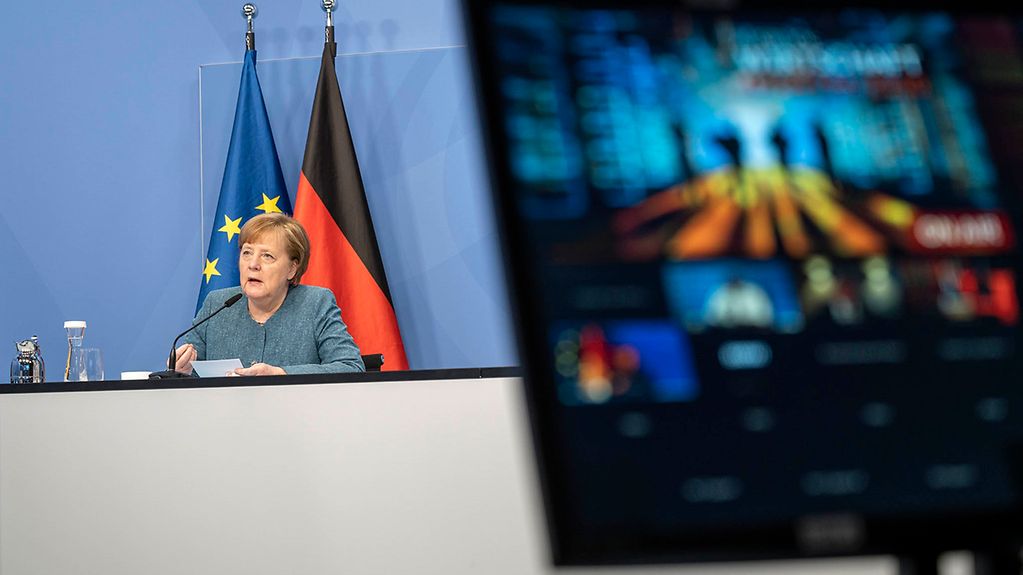Digital Summit event
“Looking ahead – digital economy 2030” – this was the motto of today’s Digital Summit event. Chancellor Angela Merkel and Federal Minister for Economic Affairs Peter Altmaier discussed selected digital issues of pivotal importance for the future with the heads of the ten Digital Summit platforms. Angela Merkel stressed that although a lot of work lies ahead, a start has been made.
3 min reading time

Speed is of the essence in the process of digital transformation, stressed Chancellor Angela Merkel during the discussion “Looking ahead – digital economy 2030”.
Photo: Bundesregierung/Bergmann
“The car of the future is more a digital project you can drive than a traditional vehicle with a few chips,” stated Chancellor Angela Merkel, giving one example of the challenge of further-reaching digitalisation. Germany has become a more highly digitalised country, but it still has ground to make up, for instance in the fields of hardware and digitalising the administration, she stressed. The transformation process is extremely swift – “and we are competing with those who come entirely from the digital world”. There is still everything to fight for, said the Chancellor, “but speed is of the essence – across the board.”
Re-thinking processes and practising
A greater awareness is needed that Germany must move ahead faster with digitalisation, said the Chancellor. It is not enough just to move the old world onto a monitor, though. Processes and approaches need to be completely re-thought and people need practice in handling them. “A lot of work lies ahead of us, but a start has been made,” underlined Angela Merkel. The shift to online working during the pandemic, for instance, worked better than expected.
Here you can see the video of the moderated discussion on “Looking ahead – digital economy 2030” with Chancellor Angela Merkel, Federal Minister for Economic Affairs Peter Altmaier and Bitkom President Achim Berg (with sign language interpreting services).
15 years since the first Digital Summit
In this, the Digital Summit, first launched 15 years ago, has played a part. “15 years of the Digital Summit have laid the foundations on which we can now build,” said the Chancellor. The format has introduced a new methodical framework for cooperation between business and politics, which she believes has proved its worth – without it, said the Chancellor, it will not be possible to master the digital age.
The Digital Summit was first launched 15 years ago in 2006 as the IT Summit, partly in response to an initiative of the Chancellor. In 2016 it was re-named the Digital Summit. It is an important date in the calendar of digital experts, a date when politicians, businesspeople, the science and research community and civil society get together to hammer out solutions. The last summit, on 30 November and 1 December 2020 was held under the banner “Making digitalisation more sustainable”. No Digital Summit has yet been scheduled for 2021, which is election year.
Federalism in the digital age
Federal Minister for Economic Affairs Peter Altmaier believes that the challenges of digitalisation often lie in the detail, as can be seen in the case of digital administration. He does, however, hope that swifter progress can now be made here.
By contrast, Bitkom President Achim Berg believes that fragmented responsibility is the reason why Germany is trailing in the field of digital administration. The Federal Government is in a good position in many projects, but the key question is still how the Länder and municipalities can be incorporated.
“We mustn’t become an interface republic”
The Chancellor too believes there is a need for discussion of the entire issue of federalism and digitalisation. One challenge for digitalisation is that the Länder, which are accustomed to federal legislation always being implemented at Länder level, are now being called on to act in unison. “We must not become an ‘interface republic’, with individual sub-systems each developing along their own path,” warned the Chancellor. She is relying on an in-depth debate about the federal system in the digital age. This will be arduous, but it is now indispensable, she said.
“The state can’t do this alone”
As well as the political level though, the private sector is called on. Politicians can put in place the framework, but more initiative must come from the private sector. “The state can’t do this alone,” declared Chancellor Angela Merkel with conviction. The Bitkom President shared her view, and added that the Mittelstand in particular still has problems with digitalisation. “The private sector must do its bit here – not only the political level,” stressed Achim Berg.